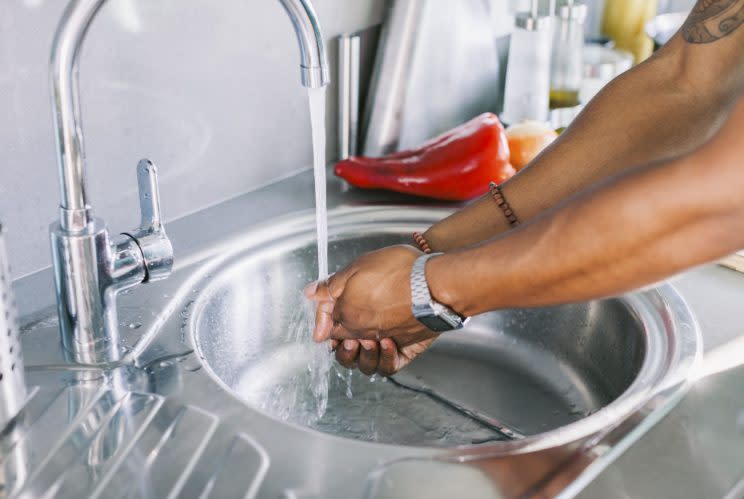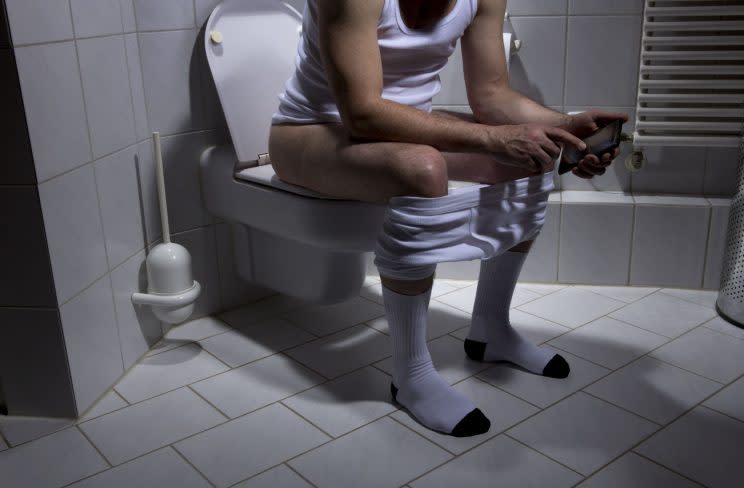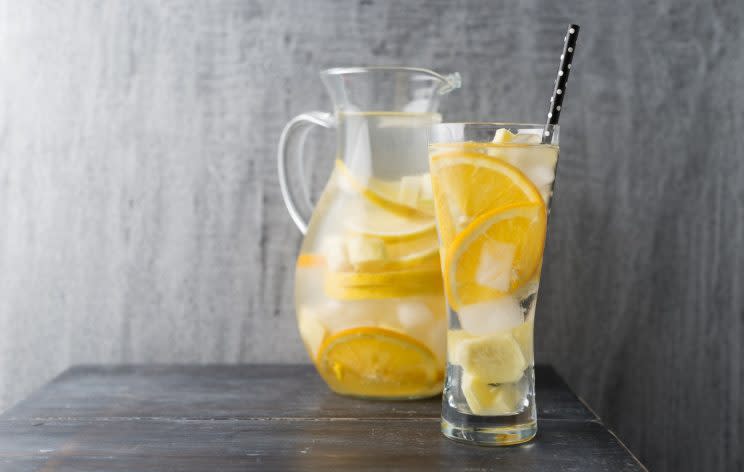Nine common hygiene errors which could make you seriously ill

Bacteria which could make you very, very sick lurk in the unlikeliest of places – from the handrails of escalators to the salad drawer in your fridge.
And who could predict that the humble bean sprout could be behind the worst food poisoning outbreak in modern history – which killed 51 people?
MORE: Flash-mob choir sings ‘Lean on Me’ to support shopworkers after robberies
MORE: Mum-of-two makes history with speedy solo Atlantic rowing crossing
Here’s some of the habits which could put you at risk of bugs such E coli and listeria – and possibly lead to a serious bout of food poisoning.
Not washing the salad drawer in the fridge

For many of us, the salad drawer isn’t exactly the most popular part of the fridge… and now scientists have warned that the lair of the vegetables is terribly, terribly dangerous.
In fact, it’s one of the dirtiest places in the kitchen, harbouring deadly bugs such as E coli and listeria – at levels up to 750 times the level considered safe.
Tests by the European Council found up to 7,850 bacteria per square centimetre, the Daily Mail reports.
Some swabs in a test of 30 frost-free fridges had up to 129,000 bacteria per square centimetre.
Experts recommend cleaning out the drawer at least once per month using soap and water – and if there’s a lot of food in your fridge, turn the thermostat colder to compensate.
Touching the handrails in a train station

An Australian TV channel conducted tests looking for harmful bacteria in a lot of busy places – but there was one that was head and shoulders above the rest.
Far above the poles on the bus, or the buttons in lifts, the handrails in station escalators scored a reading of 2337 ‘relative light units’ on a scale where anything above 30 isn’t clean.
Cleaning company Earth Ecco CEO Jake Tyson said, ‘“It’s there because there’s a lot of people touching it but it’s how that is controlled that makes all the difference.
‘If it’s above 30 it’s not clean and you don’t want anything between 135-300 as there will be a lot of bacteria. What it tells you is this area hasn’t been cleaned properly.”
‘Salmonella and E.coli are the main strains that make you sick. You hear about cruise ships where people have been taken to hospital because of E.coli and you don’t want to pick that up because you’ll be coming out at both ends.’
Eating beansprouts without washing
One popular salad ingredient is behind several large, deadly food poisoning outbreaks – and is regularly listed among the most dangerous foods out there.
In an essay for The Conversation, Professor Tim Spector of King’s College says that beansprouts and watercress are best avoided – and killed 50 people in a recent food poisoning outbreak.
In America, raw and lightly cooked sprouts have been linked to more than 30 bacterial food poisoning incidents in the last 20 years.
Professor Tim Spector says, ‘The only greens I would always avoid are sprouted foods (bean sprouts, watercress) used in salads which you shouldn’t trust.
‘They are usually grown in a warm, moist environment where bacteria thrive.
‘Sprouts contaminated with E.coli caused the worst outbreak in modern history killing 51 Germans in 2011.’
Reusing towels more than three times

Towels are really, really dirty – covered in bacteria, fungi, dead skin and unmentionable fluids from the human body.
Sharing one can lead to exposure to other people’s germs – and put you at risk of boils, spots and infections. .
Philip Tierno of the New York University School of Medicine says that even if you don’t share, you shouldn’t push the number of times you reuse a towel, ‘If you can dry it completely, no more than three times max.
Using smartphones on the toilet

Lots of us do it, but it’s a really bad idea, a GP has revealed – as it exposes phones to harmful bacteria which can make you (or others) really ill.
Speaking to SBS, Dr Anchita Karmakar says, ‘There are water and air particles that harbour in the little creases of the phone.
‘And phone covers and cases are usually made out of rubber, which is a warm and comfortable harbouring ground for bacteria.’
The problem is exacerbated by the fact that many of us use our phones while eating – making infection more likely.
Dr Karmakar says, ‘Even if you’re not using your phone on the toilet, you’re still holding it while you’re going in and out of the bathroom, and that’s enough to put bacteria on the phone when you haven’t yet washed your hands.
Eating pre-washed and bagged salad
It might look cleaner than ‘dirty’ vegetables, but the more prepared a food is, the more people have touched.
Bill Marler, a lawyer specialising in food poisoning cases, who has won $600 million for clients, says, ‘I avoid these like the plague. We’ve gotten so used to the convenience of mass-produced food—bagged salad and boxed salads and precut this and precut that.
‘Convenience is great but sometimes I think it isn’t worth the risk.’
In an article published in Food Poisoning, Marler also says he avoids pre-washed veg – and ‘raw’ juices.
Having a slice of lemon in the pub

Next time you’re asked whether you want ‘ice and slice’, you might want to rethink your options – as lemon slices are frankly filthy.
The problem is they’re handled by a lot of people, and those people often take shortcuts – such as not washing their hands.
Philip Tierno, author of The Secret Life of Germs says that his in his tests on lemon slices, he ‘always comes up with evidence of contamination from the skin, respiratory secretions, and fecal matter.’
Previous research found that up to 70% of lemon slices served in drinks at restaurants had potentially harmful microbes on them.
Using one fork to cook and serve food at a barbecue
How many forks do you use when you’re barbecuing? If the answer’s ‘One’, you could be risking your health – and that of your guests.
When barbecue chefs prod bits of raw meat with a fork, then use the same one to lift off cooked burgers, it’s a shortcut to food poisoning.
‘This is when bugs found on the surface of raw meat, including E.coli, can be transferred to sterilised cooked meat,’ says food safety expert Professor John Oxford.
‘Use one fork to place raw meat on the barbecue, another to move the meat around during the cooking process and finally a third fork to move the cooked meat from the barbecue to the plate.’
Wearing festival wristbands for months
Music lovers often like to show off just how much they love live music with a wrist full of ageing festival wristbands – but it might not be a good idea.
Dr Alison Cottell of the University of Surrey analysed two bands – and found thousands of bacteria on each, a level 20 times higher than you’d see in clothing.
Cottell said, ‘Dr Cottell said: ‘It would be advisable not to wear them if working in industries such as healthcare or food preparation, where there is a risk that the bacteria may spread to other people.’

 Yahoo News
Yahoo News 

